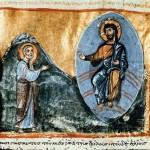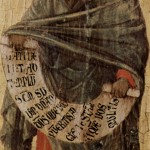
What It’s About: This is the story of Esther, queen of Persia, and her political machinations on behalf of herself and her people. This is a power play; it’s a trap sprung on her enemy Haman, who had intended to do Esther and her people harm. It’s a plot worthy of a summer blockbuster or a new fall series, and it’s actually kind of remarkable that it’s in the bible.
What It’s Really About: This is largely about identity. What happens to identity when one people is dominated by another? What becomes of their communal identity when they are subsumed into another culture? Here, the Jews are depicted as fighting to maintain their distinctiveness, while also fighting to maintain their very lives. While Persia itself is not hostile to Jews, per se, there are those among the Persians—Haman in particular—who want to do violence. Esther is using her power and influence to prevent that.
What It’s Not About: It’s not really about God. One of the great bits of trivia in biblical studies is that God isn’t mentioned in the book of Esther. But just because God isn’t mentioned doesn’t mean that God is not there. God actually plays an important role, in the background, as the font of the identity of Esther, her family, and her people. It is because of their special relationship with God, we are to understand, that they have come under this persecution, and it is somehow this same God who has provided an attitude for escape, in the person of Esther. It’s hardly an atheist text, but it takes religion out of the realm of explicit belief and puts it into the realm of shared meaning.
Maybe You Should Think About: As Christianity becomes less and less central to the mainstream culture of the United States (which I tend to think is a good thing), Christians may find themselves less and less in positions of political and cultural power. There are a few ways to react to this, most of which are unflattering to Christianity because of their pleading nature. But I think Esther might offer one vision of how to thrive and operate in an environment where your culture is not the dominant one. Our Jewish sisters and brothers have been doing this for a long time; perhaps we can learn something about how to be a graceful minority—if it comes to that—from their example.
What It’s About: This is about exhorting people to faithfulness. In this passage, the author of James is encouraging people to rely on God, and to rely on each other as a community of faith. In a broad array of circumstances, which the passage names, the author suggests prayer.
What It’s Really About: This is a simple exegesis of 1 Kings 17 and 18, where Elijah prayed for the rain to not come (there’s a new twist). But it’s interesting to think about that. What would early Christian prayer practices have been like, and what would they have seen in 1 Kings that would have made sense to them? It’s interesting that one confesses sins not to God but to one another, and then they pray for one another. That’s not quite how it works these days. I think there’s some distance between the prayer practices assumed here and the ones found in most Christian communities today.
What It’s Not About: It’s not about individualistic religion. Look how communal this all is. We pray for each other, we bring each other back from wandering. This passage from James can’t imagine that we would be Christians alone; we can only really be Christian in a community. That’s pretty remarkable, and it’s a pretty strong rebuke to those of us who would like to go it alone, under the guise of “spiritual but not religious” or some such. James thinks that the best way to be whole is in community, and it’s hard to disagree.
Maybe You Should Think About: Maybe this could be a call to renewal in your small group ministries, or your bible studies, or your Sunday School classes. Maybe it can serve as a reminder of why those things exist: to provide community and a context for Christian faith. That’s easy to forget amid all the annoyances and strains that come from being in community.
What It’s About: This is a truly strange passage. I would really divide it into three parts: verses 38-41, verses 42-48, and verses 49-50. The first part is about people we disagree with, or who are not part of our group. The second part is about removing obstacles to faithfulness (in pretty dramatic fashion). The third part is a short version of the salt sayings found in the other synoptic gospels (Matthew 5, Luke 14).
What It’s Really About: This is the sort of passage that some Historical Jesus scholars find to be authentic, precisely because it is so weird. This is the sort of stuff no one would make up, the reasoning goes, so probably Jesus said it. And assuming Jesus said it, what does it mean? I think the overarching message here is that we shouldn’t presume to know other people’s motivations, and we shouldn’t pre-judge the results of their efforts. Just because they don’t belong to our subset of Christianity, doesn’t mean we have license to oppose them or put them down.
What It’s Not About: I don’t think Jesus is advocating bodily mutilation here—not really. But he’s making a point about the seriousness of removing obstacles.
Maybe You Should Think About: As it turns out, I’m preaching this text, and I think I’m going to focus on ecumenism. I come from what some people call “Progressive Christianity,” and we have this tendency (like most Christians do) to cast aspersions on other Christians, as if only we have the truth. But this passage is a call to a kind of ecumenism that recognizes that God has many communities, and that there are many workers in the vineyards, as Jesus said. So I’m going to preach that.
















